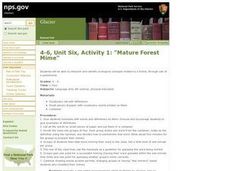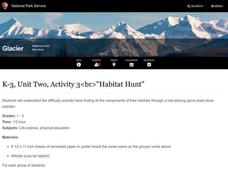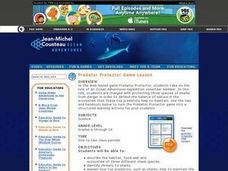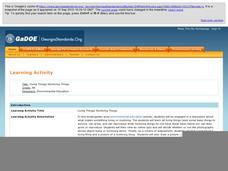Curated OER
Mature Forest Mime
Students come to understand vocabulary words through pantomime. In this vocabulary lesson, students first review several vocabulary words and their meaning, then they work in groups to pantomime the definitions.
Curated OER
Air Masses
Middle schoolers examine the physical characteristics of several types of air masses to discover how air masses can be identified and defined by their temperature and moisture content.
Curated OER
Science: All About Fish
Fifth graders describe the physical and behavioral characteristics of fish. In small groups, they complete fish fact sheets by filling in the missing key words. They play a "What Am I?" game by giving clues about various fish for...
Curated OER
Garbage in the Garden
Students create their own compost. In this soil lesson, students fill a bag with waste and soil, in order to create a mini compost bin. Students observe the baggies over a 6 week period, they record their findings and collect data on...
Curated OER
Forest Communities
Students identify tree specimens. In this tree specimens lesson, students collect different parts of a tree from the areas around the school or their home. They then work in groups to create booklet that identifies tree specimens.
Curated OER
Scaling it Down: Caves Have Maps, Too
Measurement and map skills are the focus of this lesson, where students crawl through a "cave" made out of boxes, desks and chairs, observing the dimensions. Your young geographers measure various aspects of the cave and practice math...
Curated OER
Habitat Hunt
Students discover how hard it is for animals to find all the items needed in their habitat. In this habitat lesson, students play a game in which they pretend to be an animal, they discover that not all animals can find the food needed...
Curated OER
What State Are You?
Learners identify three states of matter and recognize plasma as fourth state. They provide examples of matter that are classified in particular state and identify properties of each state of matter.
Curated OER
Predator Protector Game
Students take on the role of an Ocean Adventures expedition volunteer member and are charged with protecting three species of sharks from danger in order to defend the balance of nature in the ecosystem. They play an online game which...
Curated OER
So You Think You're Tough
Fourth graders learn how to classify animals. In this invertebrates lesson, 4th graders discuss how we classify thinks into groups and move into a discussion about classifying animals. Students learn about the differences between...
Curated OER
Science: Solids
Second graders investigate the properties of solids and discover how to classify them. Using rulers, they measure various solids on display. In groups, they play an identification game where one students names a location, such as the...
Curated OER
Shapes (Orienteering)
Learners explore the tools of navigation. In this shapes activity, students navigate using direction cues to create a shape. Learners follow specific steps to create their shapes. Students use compasses to see the directions they are...
Curated OER
Your Weight on Other Planets
Young scholars explore their weight on other planets. For this science lesson, students view a presentation about the other planets and complete a worksheet in which they make predictions about their weight on the moon and other planets.
Curated OER
Canoe and Kayak
Students explore canoes and kayaks. In this canoe and kayak lesson, students research the history, parts, and sport of the canoe and kayak. Students then practice how to use a paddle for each boat, and go on a field trip in order to use...
Curated OER
The Difference Between Comets, Meteors And Asteroids
Students use Venn diagrams to highlight the similarities and differences between comets, meteors, and asteroids.
Curated OER
Basic Orienteering
Learners study orienteering. In this science lesson, students study the parts of a compass and use the compass to set a bearing and follow the bearing on the compass.
Curated OER
Breaking it Down
Students discover how water expands when frozen during a glacier. In this matter lesson, students fill a glass jar with water, leaving no room for air in the jar and place it in the freezer. Students retrieve the jar and notice the...
Georgia Department of Education
Living Things/ Nonliving Things
How can you tell if something is living or nonliving? Introduce a set of criteria which can be used to determine which things are alive and which are not. The class discusses the basic needs of all living organisms, checks out an...
Curated OER
Wind Effects on Model Building: Pre-Lab for Truss Design and Testing
Emerging engineers perform pre-lab calculations in this first of a three-part lesson on model building. They determine the forces of tension and compression in a truss. After completion of the worksheet, pupils will draw a draft of their...
BioEd Online
Muscles and Bones: Nutrition
Got milk? Or almonds, sardines, or tofu? Calcium is important throughout life, but especially so for developing bodies. If teens do not consume enough calcium while they are growing, they are at a much higher risk of osteoporosis and...
Baylor College
Your Energy Needs (BMR)
How many Calories one needs on a daily basis is dependent on a number of factors including gender, height, and activity level. In the third of seven lessons about energy and food, young nutritionists calculate the number of Calories...
Baylor College
Your Nutrition Needs
It takes some work to ensure you have a balanced diet, but once you know the types of foods that are good for you, it becomes second nature. In the sixth of seven lessons about energy and nutrition, learners create a healthy eating plan...
Curated OER
Readings in Hudson River Natural History
Reading and understanding informational text is a key element to understanding every discipline. Elementary learners read three different articles focused on various animals and habitats in the Hudson River. They answer comprehension...
Curated OER
Finding the Salt Front
Students discuss definitions of estuary, salinity, and the salt front. They listen as the teacher explains the Hudson River Miles and ways the upriver and downriver sections relate to the north and south. Students graph the salt front...
Other popular searches
- Adaptive Physical Education
- Physical Education Games
- Physical Education Warm Ups
- Physical Education Lessons
- "Physical Education" | Pe
- Physical Education Adhd
- Physical Education Athletics
- Physical Education & Health
- Physical Education Add
- Physical Education Pe
- Physical Education Added
- Physical Education Programs

























